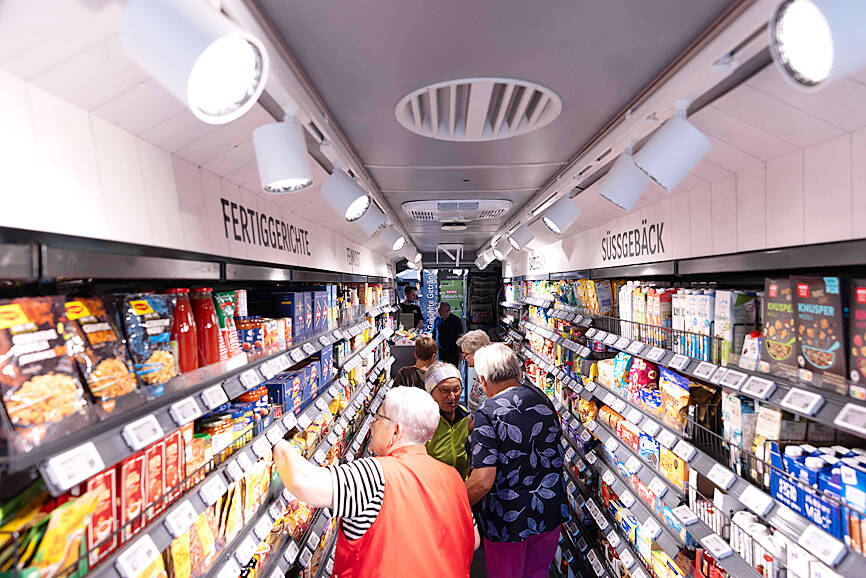In the western German village of Lohne, where the only grocery store closed its doors earlier this year, residents do their food shopping on board a red-and-green supermarket bus that rolls into the main square once a week.
For 90 minutes, locals get a chance to buy the essentials without having to get into a car to drive to the nearest store.
The supermarket-on-wheels is a pilot project between Germany’s third-largest food retailer, REWE, and the Deutsche Bahn railway company.

Photo: AFP
The bus began plying its route in March, catering to rural villages in the state of Hesse where brick-and-mortar stores have become an increasingly rare sight, turning some areas into so-called food deserts.
For the about 600 inhabitants of Lohne, where the balconies are dotted with colorful geraniums, the arrival of the REWE shopping bus is a welcome sight after the village’s only mini-mart closed for good in the spring.
“I can get the basics here,” said 90-year-old Inge Nehreng, who rode her electric trike 3km to join the weekly bus rendezvous.
“If I need something special, I go to a department store,” she added.
Parked on the village square, the 18m long bendy bus carries more than 950 everyday products. Fresh fruit and vegetables are on display outside the bus, while inside the choice ranges from food items to cigarettes, newspapers, soap and condoms.
“The only things missing are nappies and wet wipes,” said Yasmine Schneider, 34, who was shopping with her toddler Felix.
The mobile supermarket has also become a popular meeting place, a chance for the often elderly residents to catch up while getting their weekly groceries.
“After shopping, we sit on a bench and talk a bit,” said 85-year-old Ursula Sauer, who lives alone.
From Monday to Saturday, the supermarket bus covers a 600km route, stopping at 23 villages.
The prices on board “are the same” as in the REWE supermarkets, said Joern Berszinski, who manages the supermarket bus.
Deutsche Bahn provides the driver for the project, while the onboard cashier is employed by REWE.
Despite its appeal, it remains to be seen how profitable the bus service will be.
“It takes three years for a stationary shop to turn a profit, the bus could also take a few years,” said Berszinski, who has run franchises under the REWE banner for 30 years.
A key selling point for the mobile supermarket is that REWE can reach more customers with a single sales team.
“At a time when there’s a shortage of skilled workers, that’s an advantage,” said Frank Klingenhoefer, in charge of mobility services at Deutsche Bahn Regio.
The bus project has not gone unnoticed in Germany, where nearly 2,000 supermarkets of fewer than 400m2 have closed over the past decade, EHI retail research group said.
“Many communities in other regions have expressed an interest,” Klingenhoefer said.
The REWE supermarket group plans to wait until the end of the pilot project in March 2025 before deciding whether to expand.
Deutsche Bahn already has eight “medical buses” crisscrossing the countryside to tend to Germany’s aging population in remote areas. It also has plans for a bus offering banking services.
Klingenhoefer said he could imagine services like shoe and clothing repairs on wheels as well, anything “where the needs of a single village are too small” to justify a brick-and-mortar investment.

VAGUE: The criteria of the amnesty remain unclear, but it would cover political violence from 1999 to today, and those convicted of murder or drug trafficking would not qualify Venezuelan Acting President Delcy Rodriguez on Friday announced an amnesty bill that could lead to the release of hundreds of prisoners, including opposition leaders, journalists and human rights activists detained for political reasons. The measure had long been sought by the US-backed opposition. It is the latest concession Rodriguez has made since taking the reins of the country on Jan. 3 after the brazen seizure of then-Venezuelan president Nicolas Maduro. Rodriguez told a gathering of justices, magistrates, ministers, military brass and other government leaders that the ruling party-controlled Venezuelan National Assembly would take up the bill with urgency. Rodriguez also announced the shutdown

Chinese President Xi Jinping’s (習近平) purge of his most senior general is driven by his effort to both secure “total control” of his military and root out corruption, US Ambassador to China David Perdue said told Bloomberg Television yesterday. The probe into Zhang Youxia (張又俠), Xi’s second-in-command, announced over the weekend, is a “major development,” Perdue said, citing the family connections the vice chair of China’s apex military commission has with Xi. Chinese authorities said Zhang was being investigated for suspected serious discipline and law violations, without disclosing further details. “I take him at his word that there’s a corruption effort under

China executed 11 people linked to Myanmar criminal gangs, including “key members” of telecom scam operations, state media reported yesterday, as Beijing toughens its response to the sprawling, transnational industry. Fraud compounds where scammers lure Internet users into fake romantic relationships and cryptocurrency investments have flourished across Southeast Asia, including in Myanmar. Initially largely targeting Chinese speakers, the criminal groups behind the compounds have expanded operations into multiple languages to steal from victims around the world. Those conducting the scams are sometimes willing con artists, and other times trafficked foreign nationals forced to work. In the past few years, Beijing has stepped up cooperation

The dramatic US operation that deposed Venezuelan president Nicolas Maduro this month might have left North Korean leader Kim Jong-un feeling he was also vulnerable to “decapitation,” a former Pyongyang envoy to Havana said. Lee Il-kyu — who served as Pyongyang’s political counselor in Cuba from 2019 until 2023 — said that Washington’s lightning extraction in Caracas was a worst-case scenario for his former boss. “Kim must have felt that a so-called decapitation operation is actually possible,” said Lee, who now works for a state-backed think tank in Seoul. North Korea’s leadership has long accused Washington of seeking to remove it from power